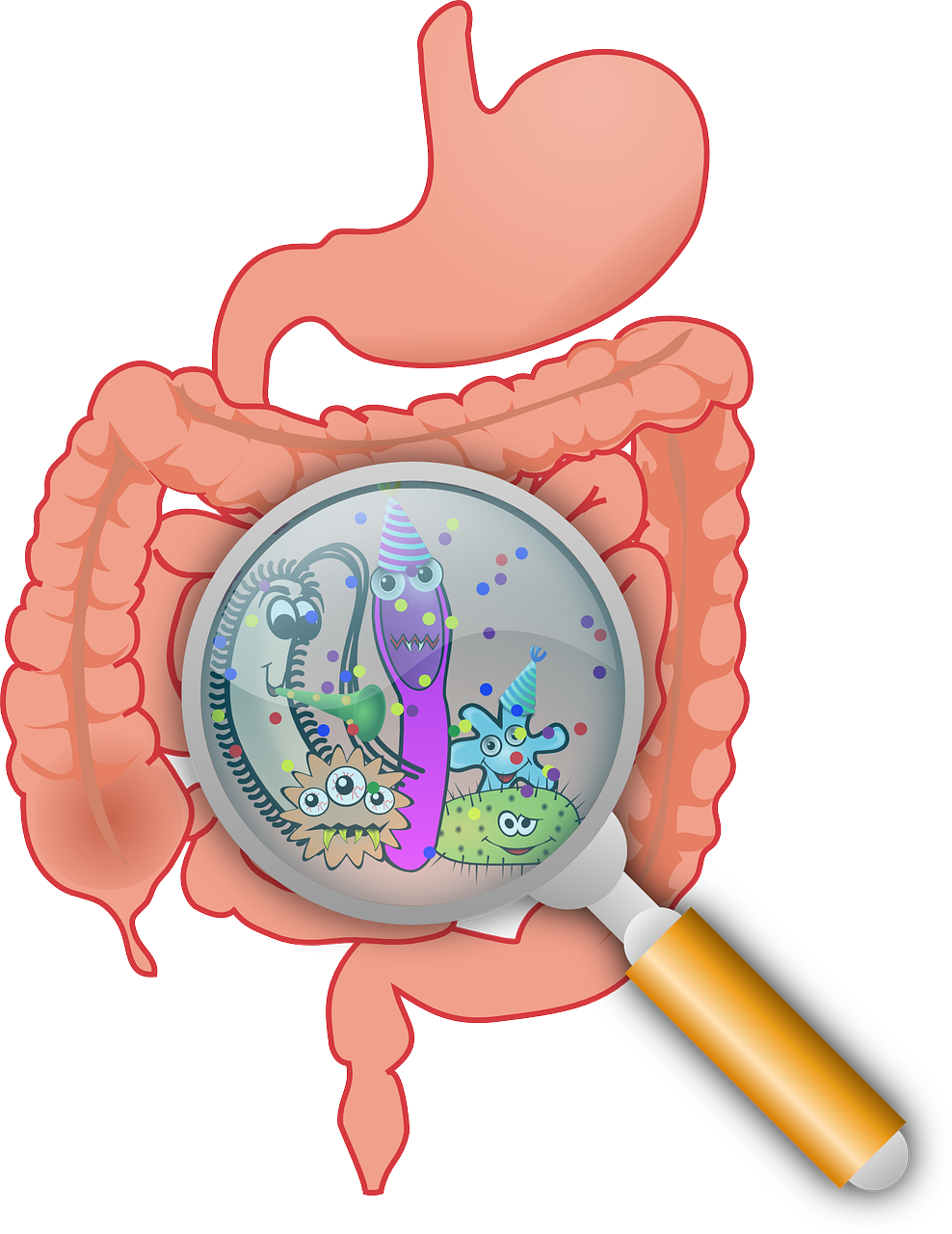The Importance of Bowel Flora
Bowel flora are important for good health. You have between four and seven pounds of bacteria in your bowel. There are more bacterial cells there than there are in your entire body. They belong there.
Beneficial bacteria do the following:
- Produce vitamins like folic acid and B12.
- Nourish the lining of the colon by producing butyric acid. They do this by feeding on vegetable fiber. Adequate butyric acid levels reduce the chances for colon disease.
- Inhibit harmful bacteria.
- Break down toxins.
There are other bacteria and yeast that normally exist, but in smaller numbers. Think of the GI tract as an ecosystem, with a balance between beneficial and not-so-beneficial microorganisms.
Dysbiosis is an overgrowth of improper microorganisms. Perhaps the best-known form of dysbiosis is Candidiasis, which William Crook, MD, made famous in his book The Yeast Connection (Vin Books, 1986). An overgrowth of yeast, which produces toxins and undermines the health of the gastrointestinal (GI) system and the immune system, is a form of dysbiosis.
Harmful microorganisms:
- Inhibit normal bacteria, creating deficiencies of nutrients and other problems.
- Produce toxins. Harmful bacteria create toxins and inhibit normal bacteria from detoxifying the bowel. Toxins can burden the liver and affect every function in the body.
- Hydrogenate polyunsaturated fatty acids.
- Damage the intestinal lining creating increased intestinal permeability. This eventually leads to allergies and many other chronic health problems.
Symptoms:
A diagnosis of dysbiosis is controversial and is not generally recognized by traditional medicine. Some believe that allergies, chemical sensitivities, fatigue, fibromyalgia, depression, digestive problems, skin problems, headaches, joint pain and virtually any chronic health problem can be caused by dysbiosis. These health problems are the result of nutrient deficiencies, toxicity, GI irritation and challenges to the immune system. Considering that most of your immune system is in your gut, believing that an imbalance in bowel flora can cause health problems is not unreasonable.
Probiotics may Help Children with IBS
Research appearing in the Journal of Pediatric Gastroenterology and Nutrition (2010 July; 51(1): 24-30) looked at the effect probiotic supplementation had on children with irritable bowel syndrome (IBS). The subjects of the double-blind, placebo-controlled study were 59 children and adolescents between the ages of four and 18, who were suffering from IBS. The subjects were randomly assigned to receive either a placebo or a high dose probiotic supplement for six weeks. The subjects who received the probiotics experienced less pain, bloating, and other symptoms when compared to the placebo group.
Irritable Bowel Syndrome Symptoms Connected to Celiac Disease
Celiac disease is a disease where exposure to gluten (a protein found in wheat and other grains) can trigger an immune response. The symptoms of irritable bowel syndrome (IBS) may be due to celiac disease in some patients. Research appearing in the Lancet (November 3, 2001;358:1504-1508) compared 300 patients with celiac disease to 300 healthy controls. Of the IBS patients, 66 patients with had positive antibody results, indicating gluten sensitivity. Of the 66, 14 had celiac disease (11 EMA positive, three EMA negative). Nine patients with positive antibody results were lost to follow-up or refused biopsy (only one EMA-positive patient refused biopsy), and 43 had normal duodenal mucosa. Only two of the controls had celiac disease. Compared with matched controls, irritable bowel syndrome was significantly associated with celiac disease.
IBS and Pain Medication
Research appearing in the American Journal of Gastroenterology (2000;95:157-165) looked at the connection between pain medication and symptoms of irritable bowel syndrome (IBS). A survey was given to 892 adults between the ages of 30 and 64. IBS symptoms were present in 12% of the respondents. The researchers found a significant connection between the use of pain medication and IBS.
What Foods are Triggering Your IBS Symptoms?
According to research appearing in the Annals of Internal Medicine (August 1, 2000; 133:165-175, 227-229), 10% of esophageal cancer cases may be due to drugs that cause stomach acid to flow back into the esophagus. The incidence of esophageal adenocarcinoma has been increasing in recent years. It is a condition that is more common in men than in women.
One possible cause of esophageal adenocarcinoma is gastric reflux. Gastric reflux is a situation where stomach acid flows back into the esophagus, causing heartburn. The acid irritates the lining of the esophagus. This irritation increases the likelihood of developing cancer of the esophagus.
Gastric reflux can be caused by certain medications. Researchers at the Karolinska Institute in Stockholm, Sweden examined the possible connection between the reflux-producing drugs and the incidence of cancer. They compared 618 subjects, with three different kinds of esophageal cancer to 820 subjects who did not have cancer. The researchers tracked the prescription drug-use of the subjects. In particular, they looked at five classes of drugs known to cause reflux.
People who took one of the drugs were more likely to have esophageal adenocarcinoma. If they took the drug for less than five years, the increase was not statistically significant. If, however, they took the drug for five years or more, the risk of esophageal adenocarcinoma more than doubled. Only 6.6% of those who did not take any of the medications for more than five years developed esophageal adenocarcinoma. The instance of the disease in the group taking the medications for five years or more was 17.5%. The increase occurred only in esophageal adenocarcinoma and not in other types of esophageal cancer.
IBS and Bacterial Overgrowth
Irritable bowel syndrome (IBS) may be due to bacterial overgrowth. Between 11% and 14% of Americans suffer from IBS. An article appearing in the Journal of the American Medical Association (August 18, 2004;292(7):852-858) looked into the possibility of bacteria overgrowth in the small intestine. The lactulose breath test (a way of testing for bacterial overgrowth) is abnormal in 84% of patients with IBS. Furthermore, there is a 75% improvement in symptoms when small intestine bacterial overgrowth is treated. In research that appeared in the American Journal of Gastroenterology (December 2000;95(12):3503-3506), the effect of killing small intestine bacteria was tested on IBS patients. The subjects were 202 people suffering from IBS. According to the results of a lactulose hydrogen breath test, 157 had small intestine bacterial overgrowth and 45 patients did not have bacterial overgrowth. Those with the bacterial overgrowth were treated with antibiotics. During a follow-up visit, 47 of those patients no longer had bacterial overgrowth and 48% of those patients no longer had IBS symptoms (according to Rome criteria). The subjects who tested for bacterial overgrowth during the follow-up visit did not experience improvement in symptoms. The researchers concluded that there is a link between small intestine bacterial overgrowth and IBS.
Certain Drugs Cause GERD and Possibly Esophageal Cancer
According to research appearing in the Annals of Internal Medicine (August 1, 2000; 133:165-175, 227-229), 10% of esophageal cancer cases may be due to drugs that cause stomach acid to flow back into the esophagus. The incidence of esophageal adenocarcinoma has been increasing in recent years. It is a condition that is more common in men than in women.
One possible cause of esophageal adenocarcinoma is gastric reflux. Gastric reflux is a situation where stomach acid flows back into the esophagus, causing heartburn. The acid irritates the lining of the esophagus. This irritation increases the likelihood of developing cancer of the esophagus.
Gastric reflux can be caused by certain medications. Researchers at the Karolinska Institute in Stockholm, Sweden examined the possible connection between the reflux-producing drugs and the incidence of cancer. They compared 618 subjects, with three different kinds of esophageal cancer to 820 subjects who did not have cancer. The researchers tracked the prescription drug-use of the subjects. In particular, they looked at five classes of drugs known to cause reflux.
People who took one of the drugs were more likely to have esophageal adenocarcinoma. If they took the drug for less than five years, the increase was not statistically significant. If, however, they took the drug for five years or more, the risk of esophageal adenocarcinoma more than doubled. Only 6.6% of those who did not take any of the medications for more than five years developed esophageal adenocarcinoma. The instance of the disease in the group taking the medications for five years or more was 17.5%. The increase occurred only in esophageal adenocarcinoma and not in other types of esophageal cancer.

